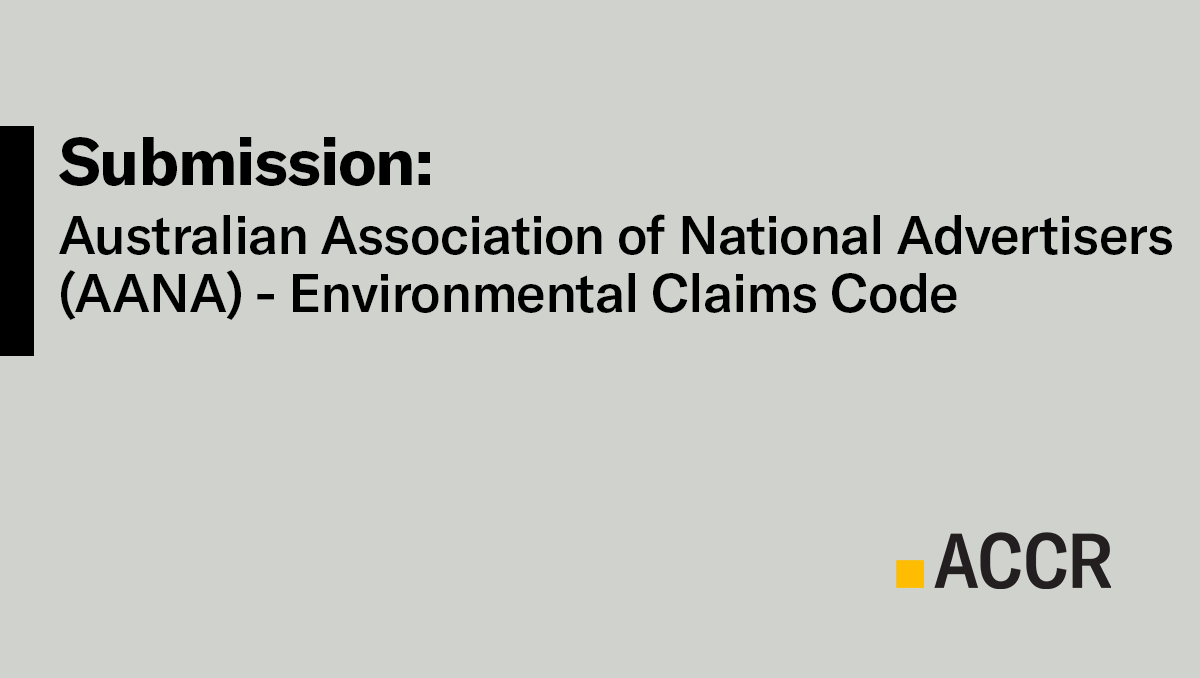Publication Submission: Environmental Claims Code
Introduction
The Australasian Centre for Corporate Responsibility (ACCR) welcomes the review of environmental claims code, as the code and process for assessing advertising has, for the most part, not successfully identified or prevented ongoing misleading environmental claims in advertising in Australia.
ACCR is a not-for-profit, philanthropically-funded research organisation, based in Australia. ACCR monitors the environmental, social and governance practices and performance of Australian-listed and international companies. We undertake research and highlight emerging areas of business risk through private and public engagement.
Companies globally and in Australia are increasingly promoting their ‘green’ credentials, as many consumers are becoming increasingly concerned about sustainability and climate claims, and the potential for ‘'greenwashing'.[1] At the same time, there is increasing investor and regulatory scrutiny around corporate claims relating to climate change, emissions reduction, and the environment. For example, the Australian Securities & Investments Commission (ASIC) has adopted an increased focus on greenwashing, which it considers can 'erode investor confidence in the market for sustainability-related products', and which 'poses a threat to a fair and efficient financial system'.[2] In January 2023, listed energy company Black Mountain Energy Limited (BME) was issued with three infringement notices and a fine, relating to its claims that two of its gas projects were 'net zero emissions'.[3]
ACCR has been directly engaged in the process of seeking accountability on corporate climate claims in Australia. On 25 August 2021, ACCR filed proceedings in the Federal Court of Australia in which it alleged that gas company Santos engaged in “greenwashing” in its 2020 Annual Report by embellishing its environmental credentials in a way that is misleading or deceptive or likely to mislead or deceive. Santos made statements that the natural gas it produces is a “clean fuel” and provides “clean energy”, and ACCR claims these statements convey that the extraction of fossil gas, and the end use of that gas, does not have a material adverse effect on the environment. The court case is now expanded, and ongoing.[4]
ACCR is of the view that when it comes to the claims made in commercial advertising in Australia, the AANA and the Environmental Claims Code have a crucial role to play, and that this review, and an openness to genuine reform is welcomed.
Overall, we are concerned that the current structure is insufficient for guarding against misleading and/or deceptive advertising, and could be improved. In particular, some important changes to the Code's definitions and scope, to the Practice Notes, and increased access by the AANA to independent expertise to help test claims made, would improve the system.
Our key recommendations are:
- The current definition of 'environmental claims' should be expanded, capturing claims made about how products are manufactured, and to capture claims relating to a particular industry or sector
- The Practice Notes should be updated to reflect important legal principles regarding misleading/deceptive conduct, under Australian Consumer Law (ACL)
- A product/company's overall environmental footprint should be taken into account when assessing the accuracy of claims made
- The Practice Notes should include guidance regarding the threshold for making an honest claim to 'net zero'
- Where claims of carbon emission reductions are made in advertising, advertisers should be required to specify the extent to which this is achieved by use of carbon offsetting. Further, companies should be compelled to publish details of any offsets which they are using, noting any applicable scheme as well as the costs of the offsets.
- Ad Standards should be able to carry out its own scientific research and analysis when determining environmental claims, including through consulting with relevant, independent scientific experts (i.e. climate scientists).
In scenarios where complaints are made in relation to environmental claims, it would be beneficial that once an advertisers' response is received by AANA, that it is made public prior to the final decision of the panel. This could include a short time period for which public comment is welcomed on the matter, that the panel could also consider as part of its review. The AANA should also outline a clear process for complainants to provide additional evidence and information, in the event that an initial complaint is not upheld. This might take the form of a review mechanism, or a secondary complaint process. It should also provide a mechanism for a public right of reply to the advertisers' response letter. Finally, we believe that the AANA should give particular time, attention and third party review opportunities when the advertising is promoting a fossil fuel product and/or that fossil fuel based product as carbon neutral, renewable, cleaner or zero emissions.
Download our full response here.
Please read the terms and conditions attached to the use of this site.
Australasian Centre for Corporate Responsibility
EY, 2021, 'Greater Expectations: Why consumers won’t stand for corporate greenwashing', https://www.ey.com/en_au/climate-change-sustainability-services/greater-expectations-why-consumers-won-t-stand-for-corporate-greenwashing ↩︎
ASIC, 2022, 'How to avoid greenwashing when offering or promoting sustainability-related products', https://asic.gov.au/regulatory-resources/financial-services/how-to-avoid-greenwashing-when-offering-or-promoting-sustainability-related-products/ ↩︎
ASIC, 2023, '23-001MR ASIC issues infringement notices to energy company for greenwashing', https://asic.gov.au/about-asic/news-centre/find-a-media-release/2023-releases/23-001mr-asic-issues-infringement-notices-to-energy-company-for-greenwashing/ ↩︎
ACCR, 2022, 'Australasian Centre for Corporate Responsibility expands landmark Federal Court case against Santos', https://www.accr.org.au/news/australasian-centre-for-corporate-responsibility-expands-landmark-federal-court-case-against-santos/ ↩︎
